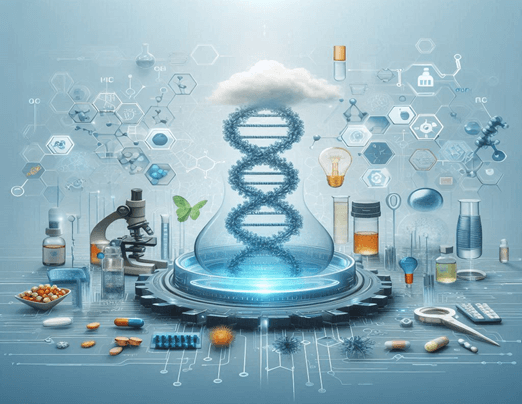The Rise of Biochemical Engineering in the Pharmaceutical Industry
Published Date: 12 Oct 2024
Biochemical engineering has been the foundation of innovation for the pharmaceutical industries. This scientific discipline draws elements of biology, chemistry, and engineering to evolve new processes that will more efficiently find new drugs, produce them, and enhance their therapeutic response. Biochemical engineering is revolutionizing the process of drug discovery, development, and manufacturing while driving breakthrough treatments and personalized medicines.

What is Biochemical Engineering in Pharmaceuticals?
Biochemical engineering focuses on the principles of both biological and chemical engineering as applied to biological organisms and molecules in processing. For pharmaceuticals, its main activities are into the design and optimization of biologically derived products, namely:
- Biopharmaceuticals, proteins, peptides, antibodies
- Vaccines
- Gene and cell therapies
- Biosensors used in diagnostics
Biochemical Engineering in Drug Discovery
a. Protein Engineering and Recombinant DNA Technology:
Biochemical engineering could lead to protein design or the development of novel proteins, enzymes, and other biological molecules in a more effective therapeutic form. Recombinant DNA technology allows the large-scale manufacturing of proteins like insulin, monoclonal antibodies, and clotting factors by inserting the required genes within host cells such as bacteria or yeast.
Role in Gene and Cell Therapy
Gene and cell therapies are indeed some of the most exciting innovations in modern medicine. To diseases previously considered incurable, this treatment offers a possible cure. Most of these treatments involve changing some cells within a patient or introducing new genes to treat genetic disorders, cancers, or other conditions.
a. Viral Vectors:
Gene therapies sometimes employ viral vectors to deliver exogenous genetic material into a patient's cells. Biochemical engineers are developing safer and more efficient means of making these vectors on a large scale, thus enabling gene therapies to reach the market sooner.
b. Cell Culture Engineering:
Cellular therapies, such as CAR-T cell therapy for cancer, require expansion and modification of a patient's cells in a laboratory before they can be returned to a body. Biochemical engineers tune the conditions for cell culture so that cells grow and function correctly.
Sustainability and Green Chemistry in Biochemical Engineering
Sustainability has emerged as a priority within the pharmaceutical industry, and biochemical engineering is driving this trend with the establishment of green chemistry principles. New biochemical processes are developed without waste, a decreased use of hazardous chemicals, and finally, a decrease in energy consumption.
a. Biocatalysis:
With enzymes as natural catalysts, they can replace severe chemical reagents in the synthesis of drugs. These biocatalytic processes generally are more selective, faster, and energy efficient than traditional chemical syntheses.
b. Renewable Resources:
Biochemical engineers are looking to use renewable raw materials such as plant-based sugars or algae in pharmaceutical manufacture to minimize reliance on fossil fuels and other non-renewable resources.
How is Biochemical Engineering Scaling Up Biopharmaceutical Production?
Biochemical engineering is critically used to scale up production from the laboratory setting to an industrial manufacturing level while ensuring product constancy and quality.
a. Fermentation and Bioreactors:
Biochemical engineers design large-scale bioreactors that rely on microbial or mammalian cells for the production of biopharmaceuticals. The goal is to make such a design optimal so that high yields and purity along with safety levels of the product are achieved.
b. Downstream Processing:
Downstream processing is the purification technique applied to the produced product after they are generated inside bioreactors. It separates the desired product from the cells, impurities, and other by-products of the manufacturing process. Advances in biochemical engineering have made these processes much more efficient so that high-purity products can easily be obtained.
Biochemical Engineering and the Future of Pharmaceuticals
The biochemical engineering future is broad and ambitious because the development is promising in the pharmaceutical industry as well as in other sectors, given healthcare needs, technological inventions, and sustainability goals. Solutions provided by biochemical engineering will only amplify the complexity raised by biologics, gene and cell therapies, and personalized medicine.
a. Personalized Medicine:
With the increasing application of personalized therapies, biochemical engineering will increasingly be applied to tailor-made drug production based on patient-specific profiles, even including such platforms as personalized biologics and genetic therapies to be made based on individual genetic makeup. Biochemical engineering will be at the forefront in producing the tools and technologies for the execution of these treatments on a satisfactory scale.
b. Next-Generation Biopharmaceuticals:
Advances in areas like CRISPR gene editing and RNA-based therapies will change the field, making biochemical engineers leaders in developing new processes and infrastructure to get those treatments to patients.
c. Nanotechnology:
Nanotechnology will hold a huge promise in terms of delivery systems that the biochemical engineers will use to design innovative, new therapies with high precision targeting specific cells and tissues for improved outcomes and with fewer side effects.
Conclusion
Biochemical engineering is revolutionizing the pharmaceutical industry and driving innovations in drug discovery, biopharmaceutical production, and sustainable practices. It perfectly combines biochemical understanding with the novel technologies of gene editing, personalized medicine, and nanotechnology. New doors are opening for advanced therapeutics-a promise of ever more closely targeted medicines, which will be effective for high numbers of patients and fewer, better treatment options. As this industry becomes more focused on biologics, gene therapies, and less environmentally intensive manufacturing approaches, the biochemical engineer will take a prominent place in playing a role in shaping the future of medicine. Therefore, it is sure that this area, through its continuous development, will bring better, more accessible, and sustainable care solutions, so the new treatments will meet the clinical and environmental demands of these future innovations.
Maximize your value and knowledge with our 5 Reports-in-1 Bundle - over 40% off!
Our analysts are ready to help you immediately.
